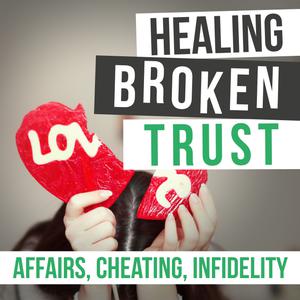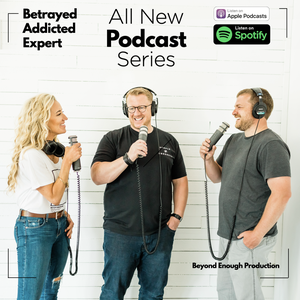
Sex, Love, and Addiction
Robert Weiss, PhD, MSW
- 32 minutes 48 secondsPart 2: A Deep Dive Into Trauma: The Good, The Bad and The Sad
Dr. Rob and Dr. Johanna O’Flaherty continue their discussion about trauma. How can recovering addicts find the healing that they need when trauma is still unknown? How can you gather the right team to support you in your recovery work? How can you find peace following big ‘T’ and little ‘t’ trauma? They answer these questions and consider the gift of working on yourself and the power of standing on your own two feet and finding your voice as you navigate your recovery journey.
TAKEAWAYS:
[1:27] How can I find the right therapist to help with my trauma work?
[5:25] The importance of gathering the right team to support you in recovery work.
[7:20] Seeking Integrity resources that are available when finances are limited.
[9:28] Differences between big ‘T’ and little ‘t’ trauma.
[12:35] Facing the haunting vision that triggers you.
[19:10] How can I come to peace following such major violations?
[24:02] Approaching brokenness and filling the void that once came with betrayal.
[26:06] The focus of the Seeking Integrity women’s intensives is not on the spouse.
[28:17] Are you ready to accept the consequences of doing whatever you want?
RESOURCES:
Free Sexual Addiction Screening Assessment
Seeking Integrity Podcasts are produced in partnership with Podfly Productions.
QUOTES:
- “Interview your therapist and find out what experience they have in trauma.”
- “The beginning of trauma work is awareness.”
- “I want you to discover the power of standing on your own two feet and finding your own voice.”
- “For every piece of work you can do on yourself, you are offering a gift to someone else.”
2 January 2025, 10:15 pm - 32 minutes 7 secondsPart 1: A Deep Dive Into Trauma: The Good, The Bad and The Sad
Dr. Rob and Dr. Johanna O’Flaherty explore trauma – what exactly is it, how does it come about, and what can you do about it? They consider the wounded healer, the importance of integrating all lived experiences to become whole again, and the role of self-forgiveness in overcoming trauma. Johanna is passionate about helping individuals heal from incident trauma, ancestral trauma, prolonged trauma, and more, and she cautions listeners against marginalizing the damaging effects of true trauma in favor of everyday difficult life experiences.
TAKEAWAYS:
[1:21] A little bit about Dr. O’Flaherty and her passion for trauma recovery.
[3:54] Dr. O’Flaherty is celebrating 47 years of personal recovery.
[5:40] The archetype of the wounded healer.
[7:31] Integrating all of our experiences is an essential part of becoming whole.
[9:18] Trauma happens outside an individual’s coping skills.
[11:20] Trauma will not leave you alone until you do trauma work.
[12:31] Self forgiveness is an essential first step to overcoming reenacting.
[16:44] Ancestral trauma can impact you and the next generation.
[20:42] My husband has been cheating on me. Why does ancestral trauma matter?
[22:50] Incident trauma happens when an event changes a person’s entire life.
[25:45] The impact of combat trauma and prolonged trauma.
[28:02] The concept of trauma has been overutilized. What can you do to heal?
RESOURCES:
Free Sexual Addiction Screening Assessment
Seeking Integrity Podcasts are produced in partnership with Podfly Productions.
QUOTES:
- “We’re all wounded in some form or another.”
- “We have to take back those wounded parts of us that we want to banish out of our minds.”
- “A traumatic event is so extraordinary that it is outside the individual’s coping abilities.”
- “Trauma will not leave you alone. It continues to raise it’s ugly head.”
- “We go into the vortex of the pain to take the power out of the memory.”
- “That which is not transformed is transmitted to the next generation.”
26 December 2024, 10:11 pm - 34 minutes 9 secondsPart 2: Stop Blaming Yourself with Tamara Cooper
Dr. Rob and Tamara Cooper continue their discussion about codependency, boundaries, and the communal value of sharing your experience with others who have found themselves in similar situations. Tamara highlights the Empowered Women Retreat, a place for betrayed partners to heal in a safe and supportive space, as well as affordable options for healing for those who don’t have the resources for therapy.
TAKEAWAYS:
[1:13] How does codependency fit into addiction and trauma betrayal?
[4:15] Addiction is a disease that affects the whole family.
[7:01] The model at Seeking Integrity is entirely supportive and judgement free.
[9:37] Setting boundaries is an essential step toward help and healing.
[11:48] Details about the Empowered Women Retreat.
[15:15] The communal power of sharing your experience with others.
[21:17] Where to turn when your spouse can’t be your go-to person anymore.
[27:25] Offering love to your addict can give them hope in themselves.
[29:05] Options for healing when you don’t have the resources for therapy.
RESOURCES:
Free Sexual Addiction Screening Assessment
QUOTES:
- “Addiction is a team sport. You don’t just run the race, you drag the whole bench out with you.”
- “If you haven’t walked a mile in the addiction shoe, I wouldn’t suggest you don’t talk about how the shoe fits.”
- “When we set boundaries, that is the ask for help.”
- “As addicts, they don’t feel worthy of love, and they can’t understand why anyone, especially the person they hurt so much, would still have love for them. And that gives them hope for themselves.”
27 November 2024, 8:26 pm - 34 minutes 6 secondsPart 1: Stop Blaming Yourself with Tamara Cooper
Dr. Rob and Tamara Cooper explore the isolating and painful blaming and shaming that betrayed partners often experience while their partners are surrounded by support. Betrayed partners often torture themselves by asking what they could have done differently to prevent their partner from acting out, and Tamara has an answer for that. Her passion for supporting betrayed partners is obvious and genuine, and she offers a glimpse into the hope and healing that can be yours if you allow it.
TAKEAWAYS:
[1:20] A little bit about Tamara and her work with betrayal trauma.
[5:10] Normalizing betrayal is a central focus of Tamara’s work.
[8:34] ‘I should have’... Betrayed partners have to stop wondering what they could have done differently.
[12:05] Why can’t I stop blaming myself for my partner’s betrayal?
[14:20] The choices that your partner makes has nothing to do with you.
[16:51] Anger, control, and self-doubt are a dangerous combination in recovery.
[20:40] Unhealthy and extreme behaviors in the betrayed are an attempt to make sense of something that doesn’t make sense.
[23:31] Isolation is a painful and common side effect of betrayal.
[27:52] An overview of Tamara’s interactions with the betrayed partners that she supports.
RESOURCES:
Free Sexual Addiction Screening Assessment
QUOTES:
- “After betrayal, but it’s normal to feel like you’re losing your mind.”
- “I am carefully and slowly speaking logic into where the core belief system has been derailed.”
- “Betrayal is a disease that doesn’t make any sense, and it’s maddening.”
- “We are born wanting to connect with someone else, and when you are out there by yourself, if someone pulls alongside you and sticks their arm out, you hold on for dear life.”
21 November 2024, 7:33 pm - 1 hour 1 minuteQ&A with Rob and Tami: When Do I Need Help for My Addiction?
Dr. Rob and Tami share what a couple can expect when they sit down and talk with Dr. Rob in person or over Zoom when they are ready to address their infidelity and addiction issues. How do you know if a residential treatment is right for you? What do you do when your spouse still continues to lie to you after formal disclosure? All these questions answered, and more!
TAKEAWAYS:
[0:45] How long does it take to rewire a porn-addicted mind?
[4:50] Addicts think, ‘they can’t live without this’ but when they take a pause they realize that they didn’t die. That they can push through.
[6:45] My husband said he’d be honest about the affairs going forward. This has been a complete lie. Where do I go from here?
[8:45] Whatever you do, don’t give up on you.
[14:15] Unfortunately, you may never get what you want from that person.
[20:25] I fluctuate between me being a horrible person vs. me being a good person that just did a horrible thing. How can I differentiate?
[25:55] I struggle to take ownership. Not sure what I should do?
[34:25] If you have a question about your spouse’s addiction, write it down. Collect them, and then sit down at a scheduled time and talk about them.
[37:45] How do you know if residential treatment makes sense for you?
[45:00] What does it mean to do a consultation with Dr. Rob?
RESOURCES:
Email Tami: [email protected]
Prodependence: Moving Beyond Codependency, by Robert Weiss
Sex Addiction 101: A Basic Guide to Healing from Sex, Porn, and Love Addiction, by Robert Weiss
Cruise Control: Understanding Sex Addiction in Gay Men, by Robert Weiss
QUOTES
-
“The brain doesn’t get rewired, it’s not a motherboard, but it does adapt.”
-
“You’re getting the kind of message that you have to work on your own life and what you want from the other person, you may never get; as much as you deserve it.”
-
“Guilt is a good thing. Healthy guilt I made a mistake, I need to go back and fix it. Guilt is good information.”
15 October 2024, 3:09 pm -
- 30 minutes 5 secondsPart 2: Honoring Yourself After Your Spouse’s Betrayal with Lora Cheadle
Dr. Rob and Lora continue their discussion about self-awareness and honoring self while also thriving in a connected partnership. Leaving your partner doesn’t make the pain entirely go away, so you have to work to honor yourself whether you choose to stay or leave. Surround yourself with people who can support you and remind you of who you really are beyond what happened to you. There are great motivating factors behind an affair and an addiction, and understanding both will make all the difference in what you can expect as you heal after betrayal.
TAKEAWAYS:
[1:25] How can you hold onto yourself and also thrive in a connected partnership?
[5:00] You may have been hurt, but you deserve to remember who you really are.
[6:43] Your life isn’t over, it’s evolving.
[8:00] When you were hurt, you were crushed. Now is the time to flaunt yourself!
[10:14] It’s hard to be a beginner, but lean into the laughter of trying new things.
[14:00] Trusting yourself can get you exactly where you want to be.
[15:05] What is an affair vs. an addictive problem?
[18:00] It is not your fault. When people cheat they are doing it for their reasons.
[20:22] Is it naive for a woman to think she won’t be cheated on by a man?
RESOURCES:
Free Sexual Addiction Screening Assessment
QUOTES:
- “You may have been victimized, but you have to start remembering who you are.”
- “Trust yourself, and seek out outside support and wisdom.”
- “Addiction is a tool that the other person is using to make themselves feel better, and the tool is never going to solve it.”
- “Trust is the backbone of our relationships.”
26 September 2024, 6:03 pm - 32 minutes 20 secondsPart 1: Honoring Yourself After Your Spouse’s Betrayal with Lora Cheadle
Lora Cheadle joins Dr. Rob to discuss the journey of self-discovery that the spouse must take after betrayal. Moments of vulnerability and self-disclosure can bring happiness into a healing marriage while also triggering feelings of old hurt, leaving spouses feeling angry and confused about whether or not they really trust their partner again. Lora understands that while you may have been victimized, you get to choose whether or not you will continue to be a victim.
TAKEAWAYS:
[1:59] A little bit about Lora Cheadle and why she wanted to share her personal experience as a recovering spouse.
[5:00] Betrayal can come as a result of spouse control and manipulation.
[7:28] Transactional relationships are set up for failure.
[10:28] You were victimized by your spouse’s betrayal – don’t let anyone minimize that for you – but you get to choose whether or not you will continue to be a victim.
[15:03] As a partner, you can support your spouse without taking on the full responsibility of their addiction.
[16:07] How can you balance trust today with the possibility of future betrayal?
[19:40] Self disclosure and vulnerability from your partner is key evidence that betrayal has stopped.
[20:30] From a performative and transactional relationship to living her truth, Lora understands what a healthy marriage really looks like.
[24:01] “She should have known better” – but addicts can be really good at hiding things.
[26:12] Find someone who you can confide in who won’t judge you.
[28:01] Yes, you can find peace in a support group of betrayed spouses.
RESOURCES:
Free Sexual Addiction Screening Assessment
QUOTES:
- “Infidelity and betrayal, for me, was my opportunity to see in myself what I had missed before.”
- “If someone isn’t doing what I think they should, the problem is theirs, right? Wrong.”
- “I did not want my husband’s addiction to win. I wanted me to win.”
- “He is a different person, but I am a different person too, so we do this dance differently.”
19 September 2024, 6:00 pm - 30 minutes 28 secondsPart 2: Couples Make it Work Only When I Do My Part with Dr. Geoff Goodman
Dr. Rob continues his conversation with Dr. Geoff Goodman about the power of the 12 Step program, which worked for Geoff when nothing else did. Finding an effective therapist who can support you and your partner requires so much more than just delving into the past - it requires making demands and setting goals that you can realistically achieve as you move forward. One huge component of recovery for both you and your partner is finding the right support groups. If the first one isn’t a good fit, don’t give up, keep trying until you are surrounded by people who can lift you up, whether you are the recovering addict or the spouse!
TAKEAWAYS:
[1:30] The power of the 12 Step program, for Geoff, is that it works.
[3:18] Understanding the why behind your addiction won’t automatically shift your behavior.
[8:50] Effective therapists will help addicts beyond simply understanding their past.
[11:28] If you’re acting out sexually in ways that are ruining your life, your therapist can help!
[13:35] Addiction recovery does not equate to relationship therapy.
[16:02] How might spouses consider self-examination without feeling blamed for their spouse’s addiction?
[19:45] Finding needed support when finances and resources don’t allow it.
[24:26] “I don’t belong there”- how to find the right support group for you.
RESOURCES:
Free Sexual Addiction Screening Assessment
QUOTES:
- “I didn’t want to make a complete lifestyle change. I wanted to get better, but avoid that.”
- “Addiction is so irresistible that knowing the causes is a nice intellectual pursuit but it doesn’t really help you on the ground.”
- “The 12 Step Program isn’t going to turn your husband into Prince Charming.”
- “You are healing and changing itself does not make you a loving, kind, empathing, engaged partner. It just means you stopped lying and stopped hating yourself.”
12 September 2024, 2:26 pm - 29 minutes 46 secondsPart 1: Couples Make it Work Only When I Do My Part with Dr. Geoff Goodman
Dr. Rob welcomes back podcast guest Dr. Geoff Goodman for a conversation about the impact that addiction has on relationships. He offers insights into the struggle of not only the addict, but of their partner as well, and shares his experience with falling in love with a woman who did not know that he was an addict. Some partners are more supportive and involved while others appear to be disinterested or even disgusted and fed up. No matter what scenario you’re in, there is hope for finding a life beyond addiction, together.
TAKEAWAYS:
[2:24] What people don’t understand about addicts, from the partner perspective.
[3:56] Dr. Geoff revealed his own sex addiction to his partner long before they were married.
[6:30] From a spouse’s point of view, learning about addiction can feel like a bait and switch.
[7:50] ‘Don’t ask, don’t tell’ only works for so long in a committed relationship. Even the ‘right one’ can’t resolve a loved one’s addiction.
[10:15] Willing yourself out of addictive behavior has a very short success rate.
[11:22] When enough is enough, there is hope for addicts.
[12:46] Addiction prevents partners from being fully committed to each other, both in and out of the bedroom.
[16:40] Reading literature about porn addiction can help a partner understand what you are going through.
[18:46] Your partner knows better than anyone what you are going through in recovery.
[19:39] Geoff’s career of treating sex addicts didn’t start until he was in recovery.
[22:40] Geoff explains why he doesn’t self-disclose to his patients.
[24:50] The impact of addiction and recovery on parenting.
RESOURCES:
Free Sexual Addiction Screening Assessment
QUOTES:
- “From a spouses’ point of view, addiction must feel like a bait and switch.”
- “Reading literature about porn addiction helped broaden the picture to help her understand that this isn’t unique to me. This is a problem that many men experience.”
- “I can’t even imagine being a father and acting out, even though I know it happens all of the time.”
5 September 2024, 2:24 pm - 26 minutes 37 secondsPart 2: Why Do Addicts Love to Gaslight?
Dr. Rob continues his discussion with Josh Nichols on some of the common tactics addicts and abusers use to gaslight their victims. In this episode, Josh focuses on the person who is receiving the gaslight treatment. Whatever you might be going through, there is no shame in staying with your addict. Sometimes the best thing for your family is to work through the issues, and sometimes the best thing for your family is for you to leave. Each case is individual to the person, but the most important thing you should know is that you’re not crazy and that your initial gut reaction is almost always correct!
TAKEAWAYS:
[1:35] Why do abusers work so hard to make someone think they’re crazy?
[3:35] You’re not a bad person if you were on the receiving end of this treatment.
[6:00] Abusers love to discredit your gut feelings and intuition, but your intuition is still accurate, deep down.
[8:25] A healthy person wants to have a conversation about an issue or a feeling they’re having, the gaslighter does not. They want you to be distracted by something else.
[11:45] It’s okay to question someone else’s version of reality.
[13:15] You’re not a weak person for staying with an abuser.
[15:25] What made Josh so interested in this subject?
[19:40] You’re not alone in your pain. There are many people who have had to deal with a gaslighter.
[20:00] You are not this bad person that your abuser has made you out to be!
RESOURCES:
Cruise Control: Understanding Sex Addiction in Gay Men
Prodependence: Moving Beyond Codependency
Out of the Doghouse by Robert Weiss
QUOTES:
- “Abusers do it in such a way where they make you feel silly, stupid, or crazy. They teach you to not trust your gut, but your gut is still accurate.”
- “A healthy person wants to have more conversation about it, a gaslighter does not. The whole goal is to get you off my trail.”
- “Sometimes courage is leaving, and sometimes courage is staying.”
31 July 2024, 4:42 pm - 27 minutes 26 secondsPart 1: Why Do Addicts Love to Gaslight?
Dr. Rob talks with Josh Nichols about common gaslighting tactics addicts and manipulative people tend to use. We like to think the world might be full of these calculating abusers, but often times these tactics are used as a knee-jerk reaction and come from a place of survival. Today, Josh offers some tips on how to spot a gaslighter and what you might be feeling from some of their gaslighting actions.
TAKEAWAYS:
[2:10] A little bit about Josh and why he wanted to talk about gaslighting.
[2:55] What’s the difference between gaslighting and lair?
[5:40] Victims feel like they’re going crazy and feel such relief when a therapist finally validates their thoughts.
[8:30] Why do people gaslight other people?
[10:45] A common tactic these people use is to confirm your belief in that person and then they will use this as leverage to deny your own reality.
[14:00] These people tend not to be psychopaths or sociopaths. They’re just trying to maintain control.
[17:25] A person will often try to use different tactics to cover up their gaslighting. What does this look like?
[18:00] There are three archetypes you have to look out for: The blame shifter, the victim, and the self-shamer.
[24:25] Unfortunately, gaslighters love to exploit your trust and sense of safety you have with that person.
RESOURCES:
Cruise Control: Understanding Sex Addiction in Gay Men
Prodependence: Moving Beyond Codependency
Out of the Doghouse by Robert Weiss
QUOTES:
- “These people are exploiting some kind of vulnerability and they can exploit the trust and love in the relationship.”
- “Addicts have maladaptive coping mechanisms and are really good survivors, and gaslighting becomes one of the tools.”
- “Gaslighters have three different types: The blame shifter, the victim, and the self-shamer.”
18 July 2024, 4:28 pm - More Episodes? Get the App
Your feedback is valuable to us. Should you encounter any bugs, glitches, lack of functionality or other problems, please email us on [email protected] or join Moon.FM Telegram Group where you can talk directly to the dev team who are happy to answer any queries.
 The BTR.ORG Podcast - Betrayal Trauma Recovery
The BTR.ORG Podcast - Betrayal Trauma Recovery
 Healing Broken Trust In Your Marriage After Infidelity
Healing Broken Trust In Your Marriage After Infidelity
 The Betrayed, The Addicted, The Expert
The Betrayed, The Addicted, The Expert
 Beyond Bitchy: Mastering the Art of Boundaries
Beyond Bitchy: Mastering the Art of Boundaries
 Helping Couples Heal Podcast
Helping Couples Heal Podcast
 Sexual Addiction:Strength/Hope/Recovery
Sexual Addiction:Strength/Hope/Recovery